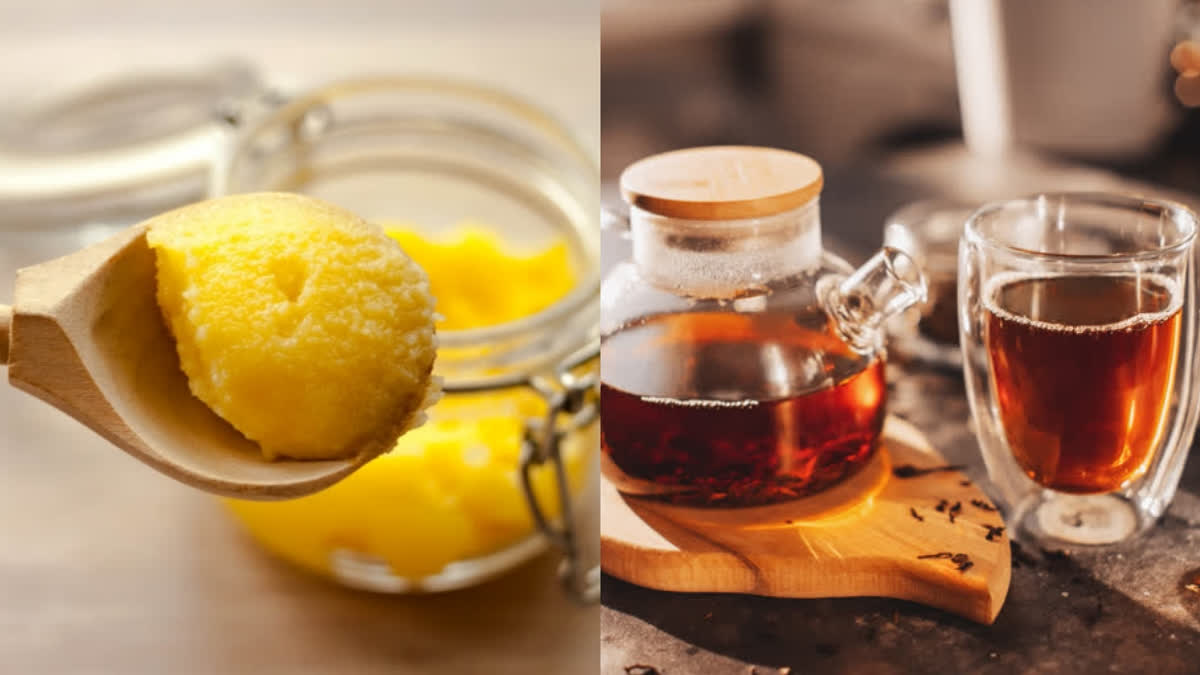In the evolving world of wellness, ancient practices are now being rediscovered and embraced with a modern twist. One such trend that’s making waves on the internet is ‘Ghee Tea’. Blend withthe rich nutrient-dense properties of gheewith the comforting warmth of the tea, this drink has become the talk of the town as a follow-up to the celebrities and nutritionists-backed ‘Ghee Coffee’ trend. Whether Ghee Tea will dethrone the popular Ghee Coffee is yet to be seen. But ever since the Delhi-based nutritionist Shilpa Arora shared a video on Instagram with a recipe for making Ghee Tea, it has taken momentum. “Add A2 ghee in boiled tea, without milk. It is an age-old Ayurvedic recipe,” Arora wrote in the caption along with the video.
YouTuber Simmy Goraya also shared her version of this tea, which she claimed helps prevent period cramps. While Arora suggested black tea with a teaspoon of ghee, Goraya's version includes a half-tea-spoon of ajwain (carom seeds) and milk along with a teaspoon of ghee for cramp relief. "You can also simply add ghee to your ‘doodh wali chai’ (milk tea) (sic)," she wrote.
Ayurveda practitioner Anjali Verma, though warns saying it is better to add ghee in black tea than in milk tea. "The blend of ghee and boiled milk which is low in alkaline can lead to acidity,” warns Verma. “When added to black tea, ghee will improve circulation in the body and improve gut health,” adds Verma.
Why Ghee Tea?
To start with, Ghee is known as a solid food in Ayurveda and has no side effects if consumed in moderation. The first tea in the morning is important to give your gut a healthy start. “Adding a spoon of ghee to your tea is a good way to start your day,” says Ayurveda practitioner Gita Ramesh founder of Kairali Ayurvedic Group breaks it down for us. She says Ghee has many medicinal properties and is valued for its rich taste and long shelf life.
“Ghee is a rich source of healthy fats. When added to tea, ghee can support the digestive system as it contains butyrate, which is essential for gut health. It helps nourish the cells in the intestines and reduces inflammation. For people who struggle with bloating or other digestive issues, ghee tea can be a soothing beverage,” stresses Ramesh. Her suggestion is to add a hint of cinnamon to black tea and then add a spoonful of ghee.
A naturopathic and clinical dietician Tahir Kamran Tak says that ghee tea can also help boost immunity as it has fat-soluble vitamins like A, D, E, and K. “These vitamins are essential for various bodily functions, including maintaining a strong immune system. If one takes a teaspoon of ghee at the start of the day, it may help enhance immunity and promote overall health,” says Tak.
Ghee tea for glowing skin
Rich in essential fatty acids, vitamins A and E, ghee nourishes the skin from within. It promotes hydration and a natural glow. Ayurveda emphasises ghee’s ability to balance the doshasand support overall wellness. “Ghee tea not only aids digestion but also improves skin elasticity and complexion,” says Verma. Dietitian Sarah Mehta adds, “The healthy fats in ghee help retain skin moisture, making it a wonderful addition to your beauty routine.”
Ancient wisdom meets modern wellness
The idea of adding ghee to beverages isn’t entirely new. Tibetan butter tea, for instance, has long been consumed by Himalayan communities for its ability to provide warmth and sustained energy in cold climates. The modern version of this ancient practice is now being adapted to the wellness world, where people are seeking healthier alternatives to energy-boosting drinks. Enter ghee tea — a contemporary take on this age-old tradition. Ramesh confirms that ghee has been used in coffee and tea for ages in Kerala.
“Freshly roasted coffee with ghee has been consumed for a long time in many Indian households. Ghee tea is also a good option for those who don’t consume coffee in the morning. The nutritional value of ghee doesn’t change. Although, it is more beneficial when consumed in the morning with your first tea,” says Ramesh. She recommends adding palm sugar or jaggery instead of white sugar to black tea.
